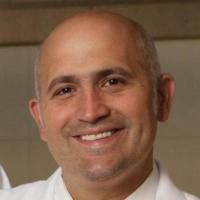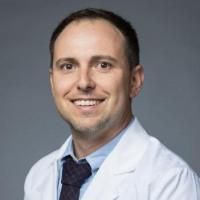W. Allen Addison, MD Professor
GIVEN BY THE FAMILY, FRIENDS, TRAINEES, FACULTY COLLEAGUES, AND ASSOCIATES OF W. ALLEN ADDISON, MD
Dr. W. Allen Addison, a nationally recognized Female Pelvic Medicine and Reconstructive Surgeon with lifelong ties to Duke, was an innovator in the sub-specialty of urogynecology and a mentor to many. A consummate physician, surgeon and teacher, he was a true giant in the field of women’s healthcare and instrumental in the training of many future ob/gyn physicians during his many years at Duke.
Onyekwere E. Akwari, MD, Endowed Professor
GIVEN BY DUKE UNIVERSITY SCHOOL OF MEDICINE
Dr. Onyekwere Akwari was the first African-American surgeon on the faculty of Duke University. He was a compassionate physician, a dedicated mentor, and a champion for underrepresented minorities and women in the field of medicine. He received his medical degree from the University of Southern California School of Medicine in 1970 and joined the general surgery training program at the Mayo Clinic. His research focused on the neural and hormonal regulation of gastrointestinal motility. During a six-month hiatus from Mayo, he designed an Emergency Medicine Residency Program for Martin Luther King Jr./Drew Medical Center for the Southeast Health Region of Los Angeles County. Dr. Akwari joined the Duke faculty in 1978 and forged the way for many Black academic surgeons after him—both at Duke and across the country. In 1989, he organized the first national meeting of the Society of Black Academic Surgeons, which was held at Duke University. Dr. Akwari died in 2019.
This professorship was created to honor Dr. Akwari’s legacy, and to support a faculty member who has distinction in the field of surgery and shares commitments to equitable and compassionate care of patients and to mutual respect and collegiality among all who are called to care for patients, as Dr. Akwari did during his decades-long career in medicine.
Distinguished Professor of Anesthesiology
Duke University established this professorship in 2005 to support a scholar of true eminence and excellence in the field of anesthesiology.
The four additional Distinguished Professorships in Anesthesiology are vacant. The School of Medicine looks forward to filling these professorships in the near future.
Banks Anderson Sr. Chair of Ophthalmology
EPONYMOUS
Dr. William Banks Anderson graduated from the University of North Carolina at Chapel Hill in 1920, and went on to receive his MD from John Hopkins University School of Medicine. He completed postgraduate training at the Massachusetts Eye and Ear Infirmary in 1927. In 1937 he was appointed Associate Professor of Surgery in charge of Ophthalmology at what was then called the Duke University Medical Center. In 1949, Anderson became Professor of Ophthalmology and Chief of the Division of Ophthalmology. In 1962, Anderson obtained one of the earliest fundus cameras available and a Zeiss xenon arc photocoagulator for treatment of diabetic retinopathy and retinal tears. Anderson retired from Duke University in 1965 and passed away in 1977.
The Banks Anderson, Sr. Chair of Ophthalmology is vacant. The School of Medicine looks forward to filling this professorship in the near future.
The Brenda E. Armstrong, MD Distinguished Professorship
GIVEN BY DUKE UNIVERSITY
This professorship honors Dr. Brenda E. Armstrong, a true trailblazer who overcame discrimination and other obstacles to become the University's first African-American professor in pediatrics, and the second Black woman in the country to become board-certified in pediatric cardiology. Dr. Armstrong served the Duke University School of Medicine for more than 20 years as associate dean for admissions and later as senior associate dean for student diversity, recruitment, and retention. Under her leadership, the University's Admissions Committee created an admissions process that values academic talent, leadership, altruism, and the diversity that enriches the School of Medicine and our community. This professorship celebrates the value of education in reducing health disparities and helping to create a more just society.
Robert C. Atkins, MD, and Veronica Atkins Professor of Pediatrics
GIVEN BY THE DR. ROBERT C. AND VERONICA ATKINS FOUNDATION
Robert C. Atkins, MD, founded and was medical chair of the Atkins Center for Complementary Medicine and author of Dr. Atkins’ New Diet Revolution, a New York Times bestseller for nearly six years. The Atkins Foundation funds independent scientific research examining the role of metabolism and nutrition in obesity, diabetes, cancer, heart disease, Alzheimer’s disease, and other serious health problems. Dr. Atkins died in 2003.
The Robert C. Atkins, MD and Veronica Adkins Professorship in Pediatrics is vacant. The School of Medicine looks forward to filling this professorship in the near future.
Virginia Flowers Baker Professors of Orthopaedic Surgery
GIVEN BY LENOX D. BAKER, ROBERT FLOWERS BAKER, AND LENOX D. BAKER JR.
Dr. Lenox D. Baker was a member of Duke University School of Medicine’s first four-year graduating class in 1934. After training in orthopaedics at Johns Hopkins, he returned to Duke as an assistant professor of orthopaedic surgery and then chief of the Division of Orthopaedic Surgery. Baker led the establishment of the North Carolina Cerebral Palsy Hospital (now the Lenox Baker Children’s Hospital), and served as medical director until his retirement. Baker and his sons established this endowment in memory of their wife and mother, Virginia Flowers Baker, daughter of Duke University President Robert Lee Flowers.
Paul G. Barash Professor of Anesthesiology
GIVEN BY DUKE UNIVERSITY
Dr. Paul G. Barash, former chair of the Department of Anesthesiology at the Yale University School of Medicine, was one of the giants in anesthesiology and a mentor for many in the Duke University School of Medicine. He was a notable clinician, investigator, teacher, and founding editor of his internationally renowned textbook Clinical Anesthesia. Barash was recognized for his commitment to teaching, his application of innovative technology to learning, and his positive contributions to the advancement of anesthesia education. He played a critical role in the development of the first anesthesia software designed for handheld devices as well as an award-winning interactive anesthesia CD, cited as the best teaching CD in medicine, science and technology. He also led the development of many standard methodologies of cardiac anesthesia, including the use of pulmonary artery catheterization and intraoperative echocardiography. He died in 2020 at age 78.
Richard and Kit Barkhouser Professor of Ophthalmology
GIVEN BY RICHARD G. AND KIT BARKHOUSER
A native of Arkansas, Richard G. Barkhouser served in the U.S. Navy, held a chartered accountant degree from the University of Madrid, and was president of Barkhouser Ford in Danville, Virginia. He and his wife, Kit, generously supported glaucoma research through the Barkhouser Clinical Research Unit, the Albert Eye Research Institute, and the fund for the Duke Eye Center clinical expansion. Barkhouser was chair emeritus of the Eye Center Advisory Board. He died in 2016, and Mrs. Barkhouser passed away in 2024. This endowment was established in 2007 and supports a professor in the field of glaucoma.
Frank H. Bassett III, MD, Associate Professor of Orthopaedic Surgery
GIVEN BY FRIENDS OF FRANK BASSETT AND DUKE UNIVERSITY
Dr. Frank H. Bassett III earned bachelor’s and master’s degrees from the University of Kentucky, where he played football under legendary head coach Paul “Bear” Bryant. He joined the Duke Medical Center in 1963. He served as team physician from 1966 to 1993 in several capacities, including director of the sports medicine center, head team physician for Duke Athletics, and professor of orthopaedic surgery. Upon his retirement, Bassett was inducted into the Duke Sports Hall of Fame. He also was a founding member of the American Orthopaedic Society for Sports Medicine. This endowment was established in 2004 in his honor. Bassett died in 2007.
Joseph W. and Dorothy W. Beard Professors
GIVEN BY JOSEPH W. BEARD, DOROTHY W. BEARD, AND DUKE UNIVERSITY
Joseph W. Beard, MD, joined Duke’s faculty in 1937. In 1938, his research group—including his wife, Dorothy W. Beard, a Vanderbilt School of Nursing alumna—developed the first usable equine encephalomyelitis vaccine, and identified viruses that cause leukemia in chickens. They were also the first to report tangible evidence of viruses associated with human leukemia. Joseph Beard was named a James B. Duke Professor of Surgery in 1946 and a professor of virology in 1965. Duke University established this professorship to honor the Beards and to promote research and understanding of surgery at Duke University and the wider scientific community. Dr. and Mrs. Beard requested that this professorship reflect the indispensable personal and professional support, understanding, and guidance afforded to them over the years by Dr. Deryl Hart. The couple contributed to this professorship through their estate plans.
Mary Bernheim Professor of Medicine
EPONYMOUS
Mary Hare Bernheim, PhD, earned undergraduate, master’s, and doctoral degrees from the University of Cambridge. While a graduate student, she discovered an enzyme that was found to play a significant role in mood regulation. Bernheim joined the original faculty of Duke University School of Medicine in 1930, and—the lone woman in the Department of Biochemistry—was named full professor in 1962. At her death in 1997, she was the last surviving member of the original medical school faculty. An enthusiastic aviator, she authored the book A Sky of My Own, which was nominated in 1959 by the North Carolina Board of Awards for literary competitions. Eponymous professorships are created by Duke University to honor individuals who have contributed significantly to the history of the institution.
George and Geneva Boguslavsky Professor of Ophthalmology
GIVEN BY GEORGE W. AND GENEVA BOGUSLAVSKY
George W. Boguslavsky, PhD, was educated in Russia and China before coming to the U.S. in 1930. He completed BA and MS degrees in psychology at the University of Washington. Earning a PhD in psychology from Cornell, he was hired by Rensselaer Polytechnic Institute to develop a top-tier psychology department of which he served as chairman for 20 years. Boguslavsky originally studied under Howard Liddell and furthered research in mathematical modeling of Pavlovian classical conditioning. He and his wife Geneva were married for 63 years. This endowment was created through their estate plans.
Morris N. Broad Distinguished Professor
GIVEN BY THE RUTH K. BROAD FOUNDATION, THE SHEPHARD BROAD FOUNDATION, AND THE BUSSEL FAMILY
The Morris N. Broad Distinguished Professorship is named to honor the life and service of Morris N. Broad, who was known among his family and friends for his personal warmth, excellent judgment, and enthusiastic support of basic neuroscience research. A philanthropist and former president of American Savings and Loan, Broad served as Director and Vice President of the Ruth K. Broad Biomedical Research Foundation, Inc., from its inception in 1988 until his death in 2016. The Foundation honors the memory of Ruth K. Broad, Morris Broad’s mother, and aims to expand knowledge to understand the causes of Alzheimer’s disease and work toward a cure by funding research in the neurosciences. In the early 1990s, the Foundation became a support corporation of Duke University.
The Morris N. Broad Distinguished Professorship is vacant. The School of Medicine looks forward to filling this professorship in the near future.
Every professorship has a great story. Read more about this one.
W. Lester Brooks Jr. Professor of Medicine
GIVEN BY DR. W. LESTER BROOKS JR. AND PATTY BROOKS
Dr. W. Lester Brooks Jr. was a 1947 graduate of Duke University School of Medicine. After continuing his training at the Medical College of Virginia and at University Hospitals in Cleveland, Brooks and his wife, Patty, moved to Charlotte, North Carolina, where he established a private practice as a family physician. In retirement, he established the Brooks Laboratory for Back Pain Research at Carolinas Medical Center in Charlotte. In 2003, the Brookses established this endowment to support a faculty member in the field of rheumatology. W. Lester Brooks died in 2012; Mrs. Brooks passed away in 2021.
Haywood Brown, MD Distinguished Professor of Women’s Health
GIVEN BY DR. STEVEN SCOTT AND REBECCA SCOTT
Dr. Haywood L. Brown is the first African-American chair of Obstetrics and Gynecology at Duke and the F. Bayard Carter Distinguished Professor Emeritus of Obstetrics and Gynecology. A maternal and fetal medicine specialist, Brown cares for women at high-risk for adverse outcomes, particularly women from underserved communities, and has long been involved in the research of substance abuse and its effects on mothers and children. Brown, a North Carolina native, received his undergraduate degree from North Carolina Agricultural and Technical State University in Greensboro and his medical degree from Wake Forest University School of Medicine in Winston-Salem. He completed his training in obstetrics and gynecology at the University of Tennessee Center for Health Sciences in Knoxville, followed by subspecialty fellowship training in maternal and fetal medicine at Emory University School of Medicine/Grady Memorial Hospital in Atlanta.
George W. Brumley Jr., MD, Assistant Professor of Pediatrics
GIVEN BY THE ZEIST FOUNDATION
Dr. George W. Brumley Jr. founded Duke’s Division of Neonatology in 1972 and served as its co-director until 1981. He then chaired the Department of Pediatrics at Emory University for 14 years before retiring to devote more time to philanthropy. He and his wife Jean Stanback Brumley founded The Zeist Foundation in 1989 as a way to teach their five children the importance of philanthropy. In 1997, with chief of Duke's Division of of Neonatology Dr. Ronald Goldberg, Dr. Brumley established the Jean and George Brumley Jr. Neonatal-Perinatal Research Institute at Duke to focus on medical issues affecting premature infants, sick newborns, and at-risk pregnant women. In 2003, Dr. and Mrs. Brumley, three of their children, and seven members of their extended family died in a tragic plane crash in Kenya.The Zeist Foundation established this professorship in memory of the Brumleys. Today The Foundation continues the Brumley family's philanthropic legacy by taking a holistic approach to address the needs of underserved children in the areas of human services, education, and arts & culture.
Jean and George W. Brumley Jr., MD, Professor of Pediatrics
GIVEN BY THE ZEIST FOUNDATION
Dr. George W. Brumley Jr. founded Duke’s Division of Neonatology in 1972 and served as its co-director until 1981. He then chaired the Department of Pediatrics at Emory University for 14 years before retiring to devote more time to philanthropy. He and his wife Jean Stanback Brumley founded The Zeist Foundation in 1989 as a way to teach their five children the importance of philanthropy. In 1997, with chief of Duke's Division of of Neonatology Dr. Ronald Goldberg, Dr. Brumley established the Jean and George Brumley Jr. Neonatal-Perinatal Research Institute at Duke to focus on medical issues affecting premature infants, sick newborns, and at-risk pregnant women. In 2003, Dr. and Mrs. Brumley, three of their children, and seven members of their extended family died in a tragic plane crash in Kenya. In 2006, The Zeist Foundation established this professorship in developmental biology in memory of the Brumleys. Today The Foundation continues the Brumley family's philanthropic legacy by taking a holistic approach to address the needs of underserved children in the areas of human services, education, and arts & culture.
E. Fulton Brylawski Associate Professor of Women’s Health
GIVEN BY E. FULTON BRYLAWSKI
Mr. E. Fulton "Bud" Brylawski established this professorship through his estate to memorialize Nancy Weaver Emerson, to promote women's health, and to benefit the many women patients who struggle with cancer. A Duke employee and an inspiration to all, Ms. Weaver Emerson fought a 20-year battle with cancer before passing away in 2003.
Mr. Brylawski was a member of the Duke Cancer Institute Board of Advisors for several years. He died in 2017 at age 92.
Butler-Harris Assistant Professor of Radiation Oncology
GIVEN BY DUKE UNIVERSITY
This professorship was established in 1997 by the Department of Radiation Oncology under the direction of then-chair Edward C. Halperin, MD. It honors the memory of two individuals who were important to the Duke Radiation Oncology team: Alisa Butler, radiation therapist, and Lucille Harris, licensed practical nurse.





















